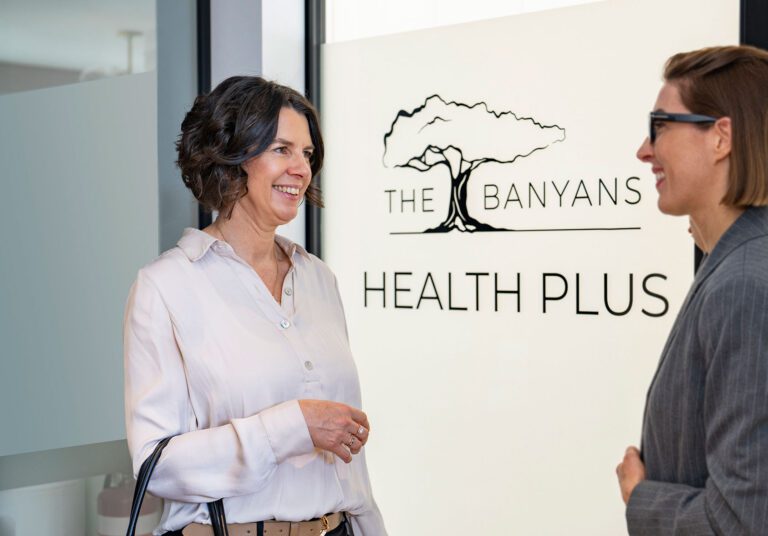
Even the best and most effective rehabilitation and recovery programs cannot guarantee that every person will complete a program healed and whole. There are a number of reasons for this, but the most important is that people are responsible for their recovery – they have to want to make changes.
You cannot force or make somebody apply the techniques they have been taught in therapy, alter their thinking pattern or increase their resilience unless they want to. Without a personal need and desire for recovery, any change made will be based on fragile motivations and may be short-lived.
“People often begin the recovery journey well before they engage professional help,” advises Peter Hayton, the Senior Psychologist and Clinical Director at The Banyans Health and Wellness. “We receive many calls from loved ones concerned about a friend, partner or child, wanting to know how they can help them, and that they have struggled to convince the individual to seek help.”
Understanding the Stages of Change for Recovery
Peter explains that each person progresses through a series of stages of change before being receptive to a recovery program like The Banyans. To help loved ones understand the process of transition from unawareness to complete recovery, Peter often describes the Transtheoretical Model (TTM) of change.
The Transtheoretical Model of change takes a biopsychosocial approach, describing the stages of change from physical, emotional and cognitive perspectives. It should be noted that although the time spent in each stage is variable for each individual, the specific tasks that characterise progression through the stages are not.
The TTM 5 Stages of Change
Below, Peter describes the five stages of change that form the TTM and how he utilises this stages of change model in his work with clients at The Banyans.
1. Precontemplation Stage: “I don’t know what you’re talking about!”
This phase can be one of the most difficult stages for support people because nothing they can say seems to get through to their loved ones.
“It is during this phase that people will see the substance or behaviour as a great root of conflict in their relationships,” Peter explains. “The person may not believe that there is a problem and will tend to become quite defensive regarding their current patterns.” He also notes that people in this stage of change will not tend to talk about their experience with others and engage in no thought of ever being without their substance or behaviour.
It is important to remember that people in the precontemplation stage often use the substance or behaviour as a coping mechanism. Thus, threatening to take this away from them can be very upsetting.
“You must be gentle in your approach with your loved one and protect your own emotions during this time of frequent turbulence and potential pain,” says Peter.
2. Contemplation Stage: Sitting on the fence.
The contemplation stage can bring great hope for loved ones as people begin to become aware of the consequences of their behaviour patterns or dependency. Although people in this phase may spend a significant portion of time thinking about their issue, they are likely to be quite uncertain about whether or not change is necessary.
“It is important that you do not rush this phase in your excitement that your loved one may be coming around,” Peter warns. “Some people can be in this phase for a number of days, weeks or even years.”
Understandably, this phase will require you to display a great amount of patience as you assist your loved one in evaluating the benefits and downfalls of commencing a more active pathway towards recovery and rehabilitation.
3. Preparation and Determination Stage: Testing the waters.
Unfortunately, this is a commonly skipped step in the stages of change model and can be a major cause of disappointment for both the person experiencing dependency or addiction and the people who care about them. During the Preparation and Determination stage, people must come to accept what it is going to take to make such a significant lifestyle change.
“Some people immediately dive into action and do not take the time to research the best methods for them,” Peter observes. “When the chosen approach doesn’t necessarily work as well as they had hoped, your loved one might become discouraged and move back to the precontemplation phase.” This is what is meant earlier, where it was highlighted that each phase is very important for achieving long-term recovery.
As a supporting person, it is important that you take the time to assist and support your loved one in this phase. Things like additional research on different types of recovery programs and suggesting external support are great ways you can do this.
4. Action Stage: The Rubber Hits the Road.
The action stage often brings the most excitement to loved ones as they begin to see active steps of change. During this phase, your loved one may adopt various methods, and obvious efforts are made to overcome their challenges.
“Throughout the action stage, people may be most vulnerable to relapse. The energy required to “stick to their guns” can be tiring,” Peter warns. He explains that people continuously evaluate their commitment, it’s benefits, and the reasons for continuing. “Returning back to their “old” way of life may be particularly appealing if stressors appear during this stage of recovery.”
The TTM suggests that people are very open to receiving help and encouragement during this stage. Loved ones are encouraged to seek additional support from qualified professionals, such as counsellors, psychologists or psychiatrists. Similarly, people in the action stage tend to respond well to short-term incentives, especially those related to self-confidence and image.
5. Maintenance Stage: From little things, big things grow
“When an individual enters the maintenance stage, they are beginning to build a new normal,” Peter says. “They have built the strength to resist temptations and have acquired new skills to deal with their triggers or drivers.” This is the ideal outcome of a recovery effort – sustained recovery and long-term avoidance of the substance or behaviour.
Peter encourages loved ones to continue their supportive role in recovery, even long after the action stage has ended. He counsels that the maintenance stage may be a lifelong process in which our loved ones constantly anticipate situations where a relapse could occur and how to cope with these situations should they arise.
“One of the best ways to support your loved one during the maintenance stage is to help them avoid their drivers where possible,” advises Peter. “Recognise that it often takes time to let go of old patterns, but with practice, they will create new healthy ones.”
Relapse as a Part of the Stages of Change Model
In some circumstances, people may move back and forward between the stages – particularly the predetermination and action stages. In some cases, it may be that a “slip up” occurred, and the person engaged in their detrimental behaviour despite making significant advancements towards recovery.
“Slip-ups are very normal for someone experiencing addiction or dependency. If your loved one experiences a slip-up, acknowledge it was a mistake and help them think through how they can avoid it next time.” Peter emphasises the importance of celebrating their progress rather than punishing them for their slip up.
This is one reason a program at The Banyans Health and Wellness extends well beyond your residential stay with us. Our team partners with guests for many months after their residential phase to assist in transitioning through the 5 stages of change, from the action stage to the maintenance stage, and support guests if slip-ups occur.
It can be quite emotional and, at times, draining to support someone at all stages of behaviour change as you pass through the highs and lows of each. The Banyans Health and Wellness is a residential rehabilitation and recovery facility – one that may be an option to consider during the contemplation stage.
Our friendly Intake team is available if you would like to begin a discussion about rehabilitation options or if you would like further advice on how you should best support your loved one. For a private, non-obligatory conversation, contact us at 1300 226 926 or submit an enquiry below.
[i]Transtheoretical Model (or Stages of Change). (2011). Pro Change Behavior Systems Inc. Retrieved 27 April 2018, from https://www.prochange.com/transtheoretical-model-of-behavior-change/














